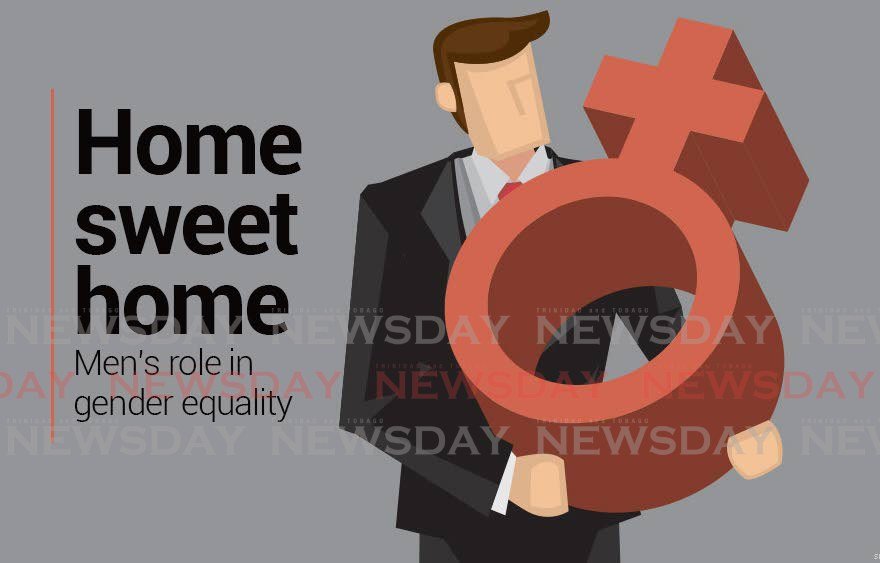Call for full gender equality in homes

Ask AFETT:
As we end the 16 days of Activism Against Gender Based Violence this week, I can’t help but wonder what more can I do as a partner and a father to further foster a sense of stability and to promote gender equality in my community?
Male Feminist
Dear Male Feminist,
Gender equality begins at home.
The home is the most likely place for a woman to be killed.
That’s probably not the opener you expected. But according to a 2018 report from the United Nations Office on Drugs and Crime (UNODC), an average of 137 women across the world are killed by a partner or family member every day. And while this report reflects data collected from countries across the world, the findings are consistent with our experience here in TT. The National Women’s Health Survey for Trinidad and Tobago (IDB, 2017) for example revealed that that 30 per cent of ever-partnered women experienced physical and/or sexual violence by an intimate partner in their lifetime. This paints the unpleasant reality that, for some women, the idea of “home sweet home” is unreal, as women continue to pay the highest price as a result of gender inequality, discrimination and negative stereotypes which contributes directly to the disproportionately heavy toll that intimate partner violence has on women.
There is no single solution. Work must continue on all fronts such as making improvements to legislation and policies and strengthening community services. Increasingly though, the importance of including men in the solution is being emphasized, and today progressively more men are getting involved in promoting equal rights and opportunities for women. And this makes sense as “working with men and boys helps accelerate progress in preventing and ending violence against women and girls as they can begin to challenge the deeply rooted inequalities and social norms that perpetuate men’s control and power over women and reinforce tolerance for violence against women and girls” (UN Women).
How can men promote gender equality? Significant first steps must start at home. More specifically, there must be full equality between men and women in the home. According to the 2019 State of the Worlds Fathers report, globally, women spend significantly more time than men – sometimes up to ten times as much – on unpaid care and domestic work. And this is not about comparing housewives against their working partners. Several surveys show that women tend to do more housework irrespective of their age, income or own workloads. This is perpetuated by the widespread expectation that caring is women’s work and men’s role as breadwinners should largely exempt them from any household chores or work that includes providing care.
The report calls for the recognition, reduction and redistribution of women’s and girls’ unpaid care and domestic work. It challenges men to step up to do more each day. This means men making the commitment to increase time spent on household chores and care work to a minimum of 50 minutes a day. Honestly, that intimidates me. But a reflection on the alternative is heart-breaking as the household work still gets done even though the workload has not been shared equally.
The State of the World’s Fathers Report present a convincing case that greater involvement by men in daily care work brings benefits for everyone. Having involved fathers is good for gender equality; it is good for women’s health; it leads to better relationships within couples and can be linked to a reduction in rates of men’s violence against women. It is good for children, too. There is ample evidence from all over the world that engaged fatherhood has a positive impact on boys and girls – and the relationships they will have as adults. Girls are more empowered, and boys are more likely to believe in gender equality and to share the unpaid work if they saw their fathers do the same.
Shared caregiving is also good for men. Research shows that men themselves benefit from greater engagement in caregiving, including improved physical, mental, and sexual health and reduced risk-taking. Fathers who are involved in the home and with their children say that it is one of their most important sources of well-being and happiness.
If our homes are to be sanctuaries as they should, all members must find peace there. Then, and only then, can we rest comfortably saying, “my family is my sanctuary”.
A
FETT is a not-for-profit organisation formed in 2002 with the goal of bringing together professional women and engaging in networking opportunities, professional training and business ideas. Ask AFETT is a column meant to address issues and concerns of professionals seeking advice to assist in progressing in their careers. Today's response was written by Kevin Liverpool, director of the Fatherhood Resource Centre. Learn more about AFETT at www.afett.com, search for AFETT Events on Facebook, follow us @AFETTEXECS on Twitter or contact us at 343-2160. Email us your career-related questions at admin.afett@gmail.com.
Look out for the release of our podcast in collaboration with the Coalition Against Domestic Violence as we explore issues on Domestic and Gender-Based Violence.
The views and opinions expressed are those of the authors, meant strictly as advice and guidance, based upon their experience and expertise. In no way are they meant to be legally binding upon AFETT and or its members, servants nor agents.

Comments
"Call for full gender equality in homes"